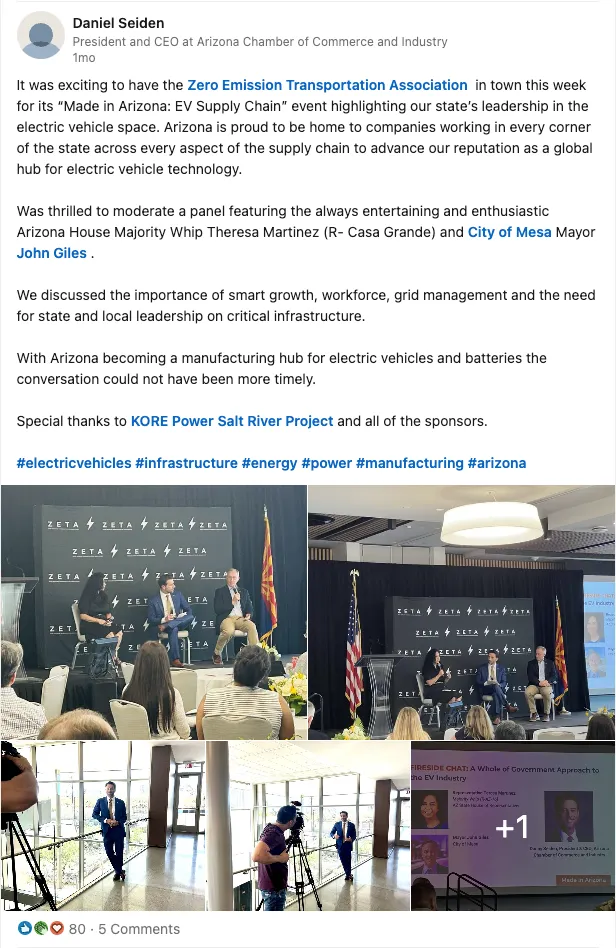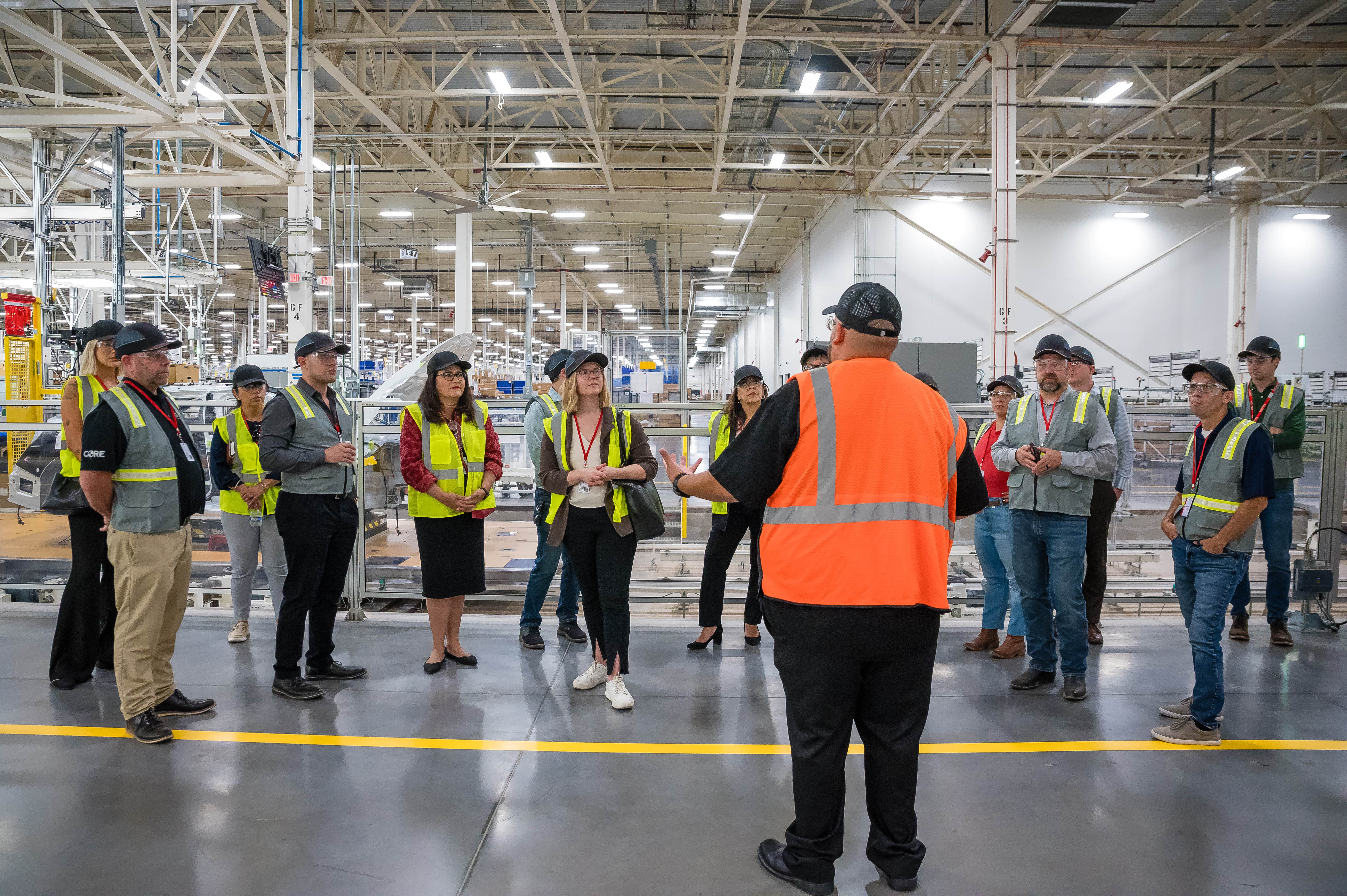Impact Report: A Post Assessment of ZETA-EF's Made in Arizona Event
Executive Summary
On August 14th and 15th, 2024, the Zero Emission Transportation Association Education Fund (ZETA EF) hosted its first Business Corridor Roundtable. The event, formally titled ‘Made in Arizona: the EV Supply Chain,’ sought to highlight EV sector investments in Arizona and rally government officials, business leaders, and community organizers around the industry’s contributions to Arizona’s economic prosperity. The resulting event was the product of time, energy, and resources invested by ZETA EF and its affiliated member companies: Salt River Project, Lucid Motors, KORE Power, Arizona Sonoran Copper/Global External, Green Power Motor Company, ABB, and Li-Cycle. Several elected officials ultimately participated in the event—including U.S. Representative Greg Stanton (D-AZ-04), State House Rep. Teresa Martinez (R-AZ-16), Mayor John Giles (R) of Mesa, and Mayor-Elect Lisa Fitzgibbons (D) of Casa Grande. This report assesses the event goals, process, and outcomes to inform replication in other states.
Introduction
From critical minerals to battery manufacturing, automotive assembly, recycling, and more, every stage of the electric vehicle supply chain supports employment in Arizona. EV and battery investments generate continued economic impact in Arizona, leading to increased tax revenue, family-sustaining jobs, and economic growth. Since 2021, EV manufacturing has created 9,700 announced direct Arizonan jobs.
In July 2024, E2 published their report ‘AZ ANALYSIS: 8 New Clean Energy, Vehicle Projects to Create 18K Jobs, Add $7B to GDP, Generate $5B in Wages for Arizona Workers.’ The report showed that EV and battery investments announced in Arizona between August 2022 and August 2023 alone are projected to generate:
Despite this tremendous investment, only 29% of Arizonans agree that the EV sector is creating jobs in the state. In comparison, only 13% say there are enough public EV charging stations in their area, according to a ZETA poll. If the consumers are not aware of the benefits the EV industry is bringing to Arizona, policymakers may not be either.
To address this known information gap, ZETA EF sought to use our positioning as a convener of the EV industry to bring stakeholders from across the supply chain and the Arizona business and policy community together to highlight the impact of the EV industry in the state.
Goal
Through this event, ZETA EF aimed to bring state, federal, and local government offices together with AZ business and community leaders to foster a deeper understanding of Arizona’s place as a leader in the domestic electric vehicle (EV) supply chain. Instead of viewing EV infrastructure projects as discrete investments, ZETA EF’s business roundtable intended to emphasize to elected officials the idea that EV investments in Arizona are part of an interconnected, broader effort to establish the U.S. as a major player in the EV ecosystem. Our primary intended outcome was that officials would come away from this event with a strong sense of ownership over the industry’s success and a strong understanding of Arizona as a hub for advanced manufacturing and EV policy development. Recognizing the continued leadership and support from the community and elected officials will lead to further investment and workforce opportunities across Arizona.
Further, ZETA EF sought to maximize the value of our time on the ground in a major EV investment state to build our arsenal of photos, videos, first-hand accounts, talking points, and strategic relationships. In doing so, ZETA EF endeavored to build on the momentum after the event’s conclusion (e.g. through the circulation of photo and video content in paid digital campaigns, published articles in local media publications, and videos at future events).
Key Takeaways
- In-state events yield crucial relationship building across the supply chain and between government and industry that has lasting positive impacts for ZETA EFs work in DC.
- There is no substitute for the excitement and education generated by first-hand experience with the supply chain. some text
- The inclusion of a joint site tour on Day 1 generated excitement surrounding Arizona’s role in the EV supply chain, increasing the value and energy of Day 2 conversations.
- Touring both a critical mineral and vehicle manufacturing plant positively increased end-to-end supply chain visibility for community and sustainability organizations that are supportive of electrification, but may not typically engage in critical minerals issues.
- Support for the EV supply chain is energized and bipartisan at the state and local levels. Testimonials from local officials add value to federal education about the impact of the policy landscape upholding the EV supply chain.
- Government officials in attendance:
- Mayor John Giles, Mesa Arizona
- Mayor-Elect Lisa Fitzgibbons, Casa Grande
- State House Republican Majority Whip Teresa Martinez
- State House Representative Deborah Nardozzi
- Arizona Corporate Commissioners
- Staff from Federal Arizona offices
- Content generated on the ground (including quotes, videos, photos, and educational information) contributes significantly to ZETA EF’s other work, such as public education digital and print advertising campaigns.
- The inclusion of electrified transportation between Tempe and Casa Grande, and during the site tour, was a well-received demonstration of the technology.
- Absent outside funding, the success of on-the-ground events relies heavily on the resources and connections of ZETA members in-state.
- The positive reception of the event was evident in organic social media traction.
Event Outline
‘Made in Arizona: The EV Supply Chain’ occurred over two days. Day 1 featured a breakfast and joint site tour of Cactus Mine and Lucid AMP-1. On Day 2, ZETA hosted a roundtable luncheon for industry executives, policy-oriented panel programming for the AZ business community, and a cocktail reception.
Day 1: Site Tour
In partnership with member companies SRP, Lucid, Arizona Sonoran Copper, and Green Power Motor Company, ZETA facilitated a 60-person joint site tour of the Cactus Mine and Lucid AMP-1. In attendance, individuals representing local, state, and federal jurisdictions of government, industry, academia, and workforce development organizations toured both sites to further understand the positive impact of the electric vehicle supply chain in Arizona.
Government:
- Mayor John Giles, Mesa Arizona
- Mayor-Elect Lisa Fitzgibbons, Casa Grande
- State House Republican Majority Whip Teresa Martinez
- State House Representative Deborah Nardozzi
- Arizona Corporate Commissioners
- Staff from Federal Arizona offices
Community/Business Leadership
- Arizona Community Foundation
- Arizona Sustainability Alliance
- Valley of the Sun Clean Cities Coalition
- Arizona Commerce Authority
- Arizona Technology Council
- Irrigation and Electrical Districts Association of Arizona
- Arizona Power Authority
Secondary and Higher Education
- Arizona State University
- Maricopa Community College
- Western Governors University
- Buckeye Union High School District
Attendees were invited to a breakfast at SRP in Tempe, Arizona where ZETA and Arizona Sonoran Copper addressed them before boarding a Green Power Motor Company School Bus to travel south to Casa Grande. Each attendee received a folder containing information about ZETA EF, one-pagers about each of the companies involved, and safety information for the mine.
Upon arrival at the cactus mine in Casa Grande, attendees were transferred from the electric school bus into a caravan of 4WD vehicles for the mine tour. The caravan consisted of several EVs, including a Rivian R1S and two EV Chevy Silverados. At the mine, attendees were given a presentation by representatives from Arizona Sonoran Copper on the history of the Cactus Mine site and of mining in Arizona, as well as the importance of critical minerals to a clean energy transition.
The caravan departed Cactus Mine for AMP-1, where attendees Lucid’s Manager of State and Local Affairs gave a presentation before attendees were split up into groups for a tour of the facility. Afterward, attendees sat for lunch and remarks from the AMP-1 Plant Manager and the Casa Grande Mayor Elect, Lisa Fitzgibbons. Day 1 attendees returned to Tempe on the Green Power Motor Company School Bus.
Day 1 Attendance:
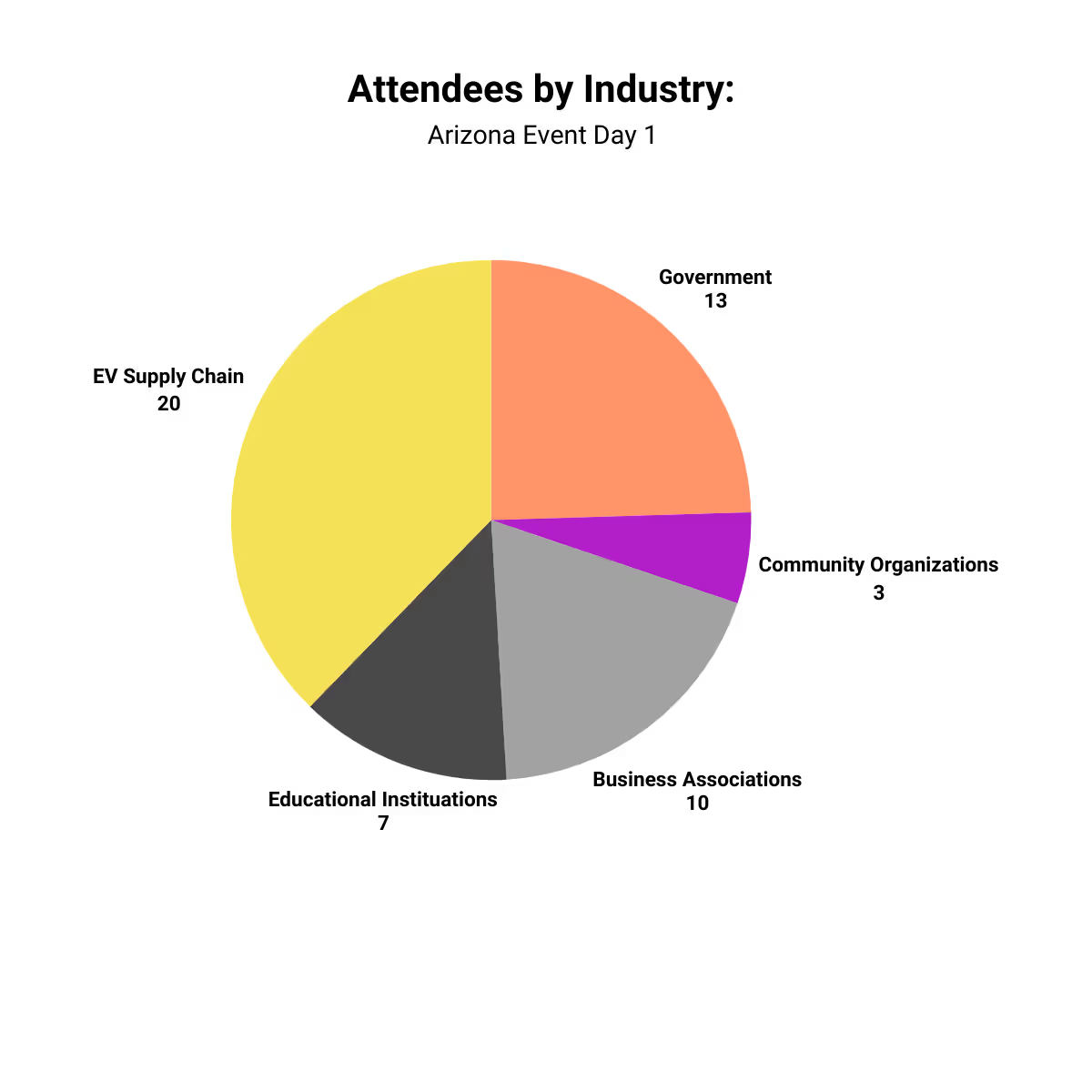
Day 2: Policy Discussions
Small Group Programming
Executive Lunch & Roundtable
On Day 2, ZETA hosted a closed-door conversation between key stakeholders ahead of the official programming to discuss the state-of-play of AZ EV investments and what types of legislative or economic/workforce development strategies could be done locally or federally to improve the current landscape.
The luncheon hosted senior-level leadership representing the EV supply chain, economic and workforce development organizations, and academia. This private roundtable provided an opportunity for a candid conversation between industry representatives and economic development organizations on what types of workforce policies are working in Arizona. The conversation showcased leaders like WESTMARC discussing recruitment strategies from STEM-focused programs in the area and connecting available positions to students who may be interested in them. Another discussion highlighted how Lucid Motors and KORE Power work with entities such as the AZ Technology Council and the AZ Chamber of Commerce to amplify workforce strategies at quarterly meetings.
Hill Staff Huddle
Before the start of programming, ZETA EF was able to meet with several Congressional staffers, several of which had attended the site tour the day prior, to answer their non-policy relation questions about the EV industry and technology.
Main Programming
“On Day 2, attendees returned for the event's main programming, building on insights from the site tours and earlier discussions to advance Arizona's role in the EV supply chain.”
Recorded Remarks from Greg Stanton
U.S. Rep. Greg Stanton (D-AZ-04) opened the event by emphasizing Arizona's rapidly growing vehicle industry, driven by a business-friendly climate and significant federal investments through the bipartisan CHIPS and Inflation Reduction Acts. These initiatives have funneled over $10 billion in clean energy investments into the state, creating 14,000 jobs. Congressman Stanton highlighted that while key companies are investing heavily in Arizona, the future growth of the industry depends on securing the semiconductor supply chain and reducing reliance on Asia. Congressman Stanton also stressed the importance of workforce training and the development of a reliable network of EV chargers to support the green economy. Stanton called for continued collaboration among government officials and stakeholders to maintain this progress.
Industry Panel: “Arizona: An EV Supply Chain Ecosystem”
Programming featured a panel of industry experts representing companies from across the EV supply chain in Arizona. The panel showcased ZETA’s ability to bring together experts from end to end of the supply chain and to amplify connectedness in a public forum.

Panel: Arizona: An Advanced Manufacturing Ecosystem
Moderated by Ryan Ruiz, Executive VP of Business Development, Arizona Commerce Authority
Tyler Snider, VP of Sustainability & External Relations at Sonoran Copper Company
Edwin Hernandez-Vargas, VP of Sustainability at KORE Power
Steven David, Senior VP of Operations at Lucid Motors
Tom Cooper, Senior Director Future System Assets and Strategy at SRP
Chris Moon, Spoke Plant Manager at Li-Cycle
Alex Ehrett, Western Public Policy & Market Development Manager at ABB
In this panel, Tyler Snider, VP of Sustainability & External Relations at Sonoran Copper Company, brought up the geopolitical challenges facing the U.S., noting that China currently produces 30 of the 50 critical minerals needed for manufacturing. He discussed transforming a Brownfield site into a top ten copper producer, emphasizing Arizona’s capacity for large-scale mining. Edwin Hernandez-Vargas, VP of Sustainability at KORE Power, outlined the company’s $1.2 billion investment in its Buckeye gigafactory, expected to employ 3,000 people and generate $16 billion in economic output for Arizona. Steven David, Senior VP of Operations at Lucid Motors, discussed the company's focus on workforce development. Lucid trains employees in advanced tooling and equipment needed for EV production, emphasizing continuous skill-building to create high-performing individuals who can become leaders within the company. This approach is vital to Lucid's strategy for long-term success. David also explained why Lucid chose Arizona, citing the state’s favorable incentives, robust infrastructure, and affordability, which allows workers to earn competitive wages while maintaining a high quality of life.
Presentation: The Hermosa Project and Critical Minerals
Pat Risner, President of South32 Hermosa Inc., provided an overview of the Hermosa Project, located in Southern Arizona. The project is the only advanced mine development in the U.S. to produce two critical minerals, manganese, and zinc, essential for EV batteries. The mine aims to set new sustainability standards, including a 95% reduction in surface disturbance, 90% less water use, and plans for net-zero emissions through renewable energy and electric fleets.
Elected Official Fireside Chat: “A Whole of Government Approach on the EV Industry”

Panel: Fireside Chat: A Whole of Government Approach to the EV Industry
During this panel, Rep. Teresa Martinez discussed key developments in Casa Grande, including the impact of the Cactus Mine and Lucid Motors. She spoke about the importance of collaboration, noting Lucid’s partnership with Central Arizona College to develop a skilled workforce. Mayor John Giles emphasized that “all politics are local,” especially when it comes to infrastructure funding, such as the half-cent sales tax that supports road development. He also pointed out that while electric vehicle adoption is accelerating, infrastructure is lagging behind. In underserved communities, Giles plans to use federal grants to extend charging stations. Danny Seiden, President & CEO of the Arizona Chamber of Commerce and Industry, noted that energy needs in Arizona are projected to grow by 40% by 2030, indicating a critical need for investment in infrastructure.
Cocktail Reception and Remarks
Following the main programming, attendees moved to a reception space for drinks and refreshments. The reception featured remarks from Brendan Riley, CEO of Green Power Motor Bus, Steven Zlystra, President and CEO of the Arizona Tech Council, and Stacy Guillen, Assistant Director of the Arizona Department of Transportation.
Day 2 Attendance:
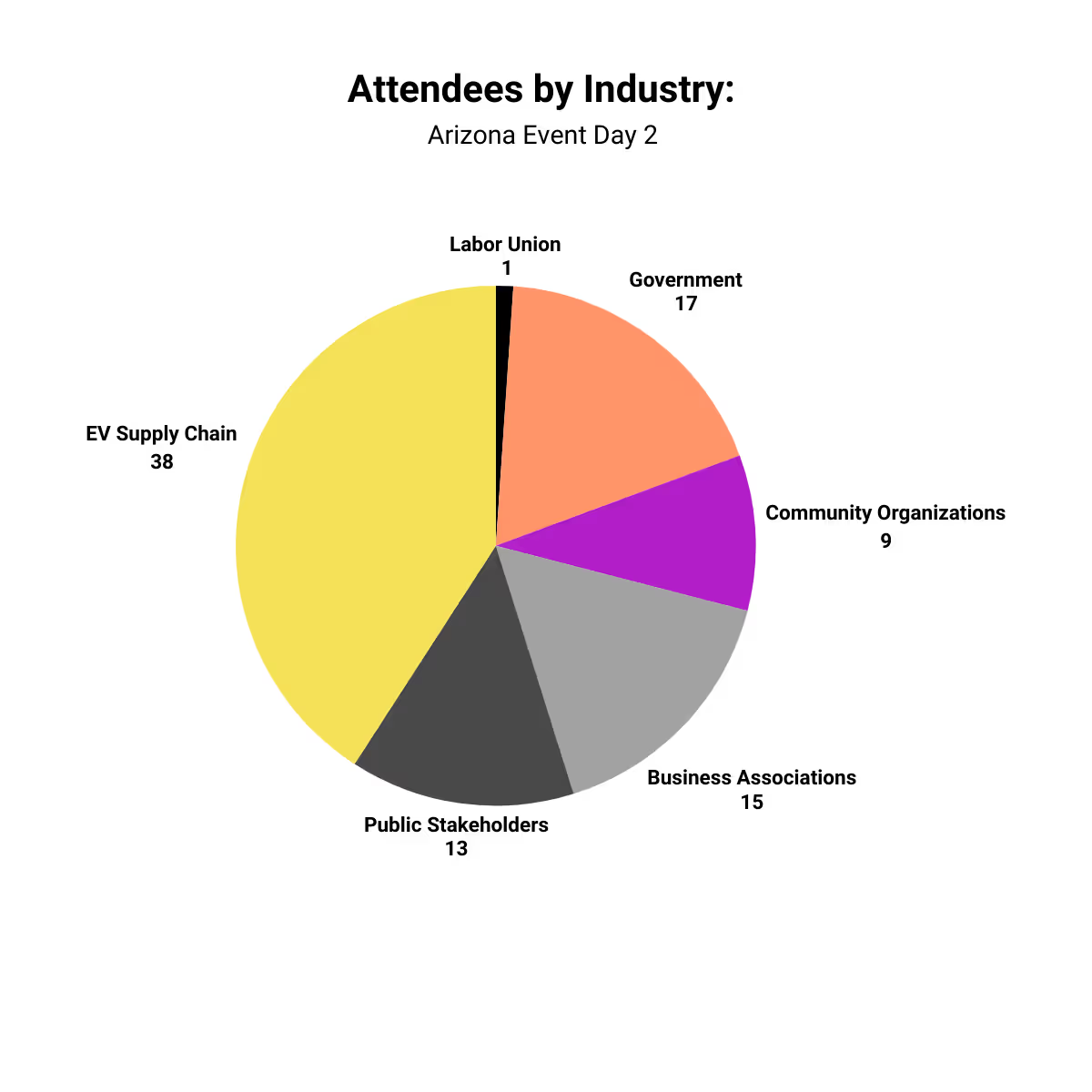

Outcomes
Impactful Messaging
Public Education and Policy Consensus
Coalition Building
ZETA’s Arizona Roundtable was made possible through cross-sector collaboration between companies acting as partners. The coalition was able to utilize ZETA member relationships on the ground in Arizona to participate in the event. The planning process not only allowed for ZETA members to deepen collaboration under the coalition’s umbrella but also brought the Arizona business community together to rally around the electric vehicle industry end to end in the state.
Additionally, the event increased ZETA’s exposure to companies outside of its membership. ZETA met with five non-member companies who participated in both programming days. The event directly resulted in adding Arizona Sonoran Copper to ZETA’s membership.
Communications
ZETA developed a multi-faceted communications plan to support the Arizona event, including earned and owned media, along with direct member engagement.
For earned media, ZETA pushed out information on the EV industry’s impact on the Arizona economy to local media outlets. We also invited select press to attend the programming on Day Two, and were happy to see the Arizona Republic attend the event to learn more about the EV industry. In addition to reporter outreach, the ZETA team also wrote and placed an op-ed by ZETA’s Executive Director in the Arizona Mirror that highlighted the significant amount of investment going into the state.
ZETA also worked to create owned media materials, including organic social media engagement and hiring a professional videographer and photographer to capture content for future materials. The team also worked directly with member companies by providing social media guidance and developing physical pull-up banners to highlight member contributions across the supply chain that were displayed on Day Two of the event.
Finally, ZETA explored the possibility of contracting researchers to develop a comprehensive economic analysis, showing the impact that the EV supply chain is having on Arizona. This would have provided fresh numbers for press and advertising efforts. Due to time and budget constraints, the team chose not to pursue this option for the event.
Formal Digital Content Collection
ZETA used this opportunity to collect photo and video content to be used in future campaigns, showcasing various parts of the EV supply chain. One result of this was the video played at the EV Awards Dinner on September 19, highlighting the programming in Arizona and the importance of collaboration between policymakers and industry leaders to the future of the EV industry. These collateral materials will also be used in future advertising campaigns and other collateral materials.
Federal Relationships
Strengthened Congressional Relationships
Time spent with Congressional staff at during both Day 1 and Day 2 of the event fostered a close relationship between ZETA EF and the Congressional Staff among the Arizona delegation. Staff were able to interact with member companies across the entire supply chain at once while also hearing from us about about how the different segments of the industry work together. The bus rides between Tempe and Casa Grande served as opportunities to answer their questions about EV supply chains and technologies and how the growth of the EV industry in Arizona has provided major employment opportunities and broader economic benefits to the state and local communities.
The successful tours and conversations on Day 1 were amplified by further interaction with Hill staff on Day 2. This began with a dedicated “ask me anything” -style discussion with the staff in attendance before the Day 2 panels, fostering candid conversation and reinforcing ZETA-EF as a reliable source of information on the EV industry. This informal meeting was followed by attending the panel discussions and the remainder of Day 2 programming.
The interaction with Hill staff throughout the AZ event culminated in two Members of Congress with staff at this event (Reps. Ciscomani and Stanton) subsequently participating as speakers during the ZETA Education Fund’s annual EV Awards event in September.
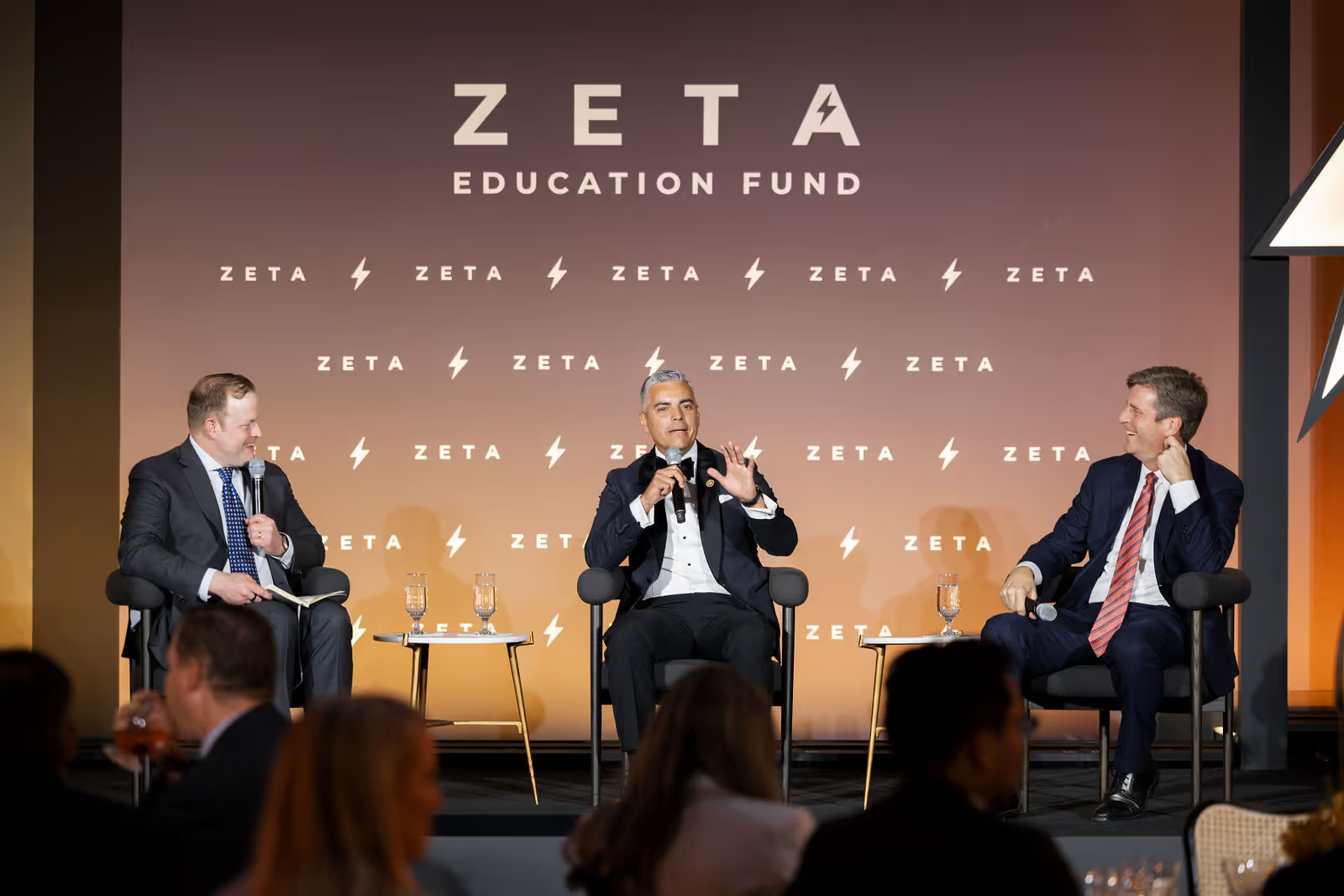
Conclusion
Forward-looking goals
- Replicate this event in more states, targeting those where we can build on existing paid digital campaigns or that have robust supply chain presence.
- Secure federal in-person participation by securing a date farther in advance and utilizing the success of the first one as credibility.
- Commission an economic impact report to coincide with the event.
ZETA member footprint in other states
- Nevada ZETA Membership
- Albemarle
- Ioneer
- Lithium Americas
- Panasonic
- Tesla
- Redwood
- EVConnect
- EVGo
- ChargePoint
*no in-membership utility
Polling in Other States
ZETA’s polling in Georgia and Tennessee show similar results to that of Arizona, suggesting that additional public education on the role of the EV industry in the local economy is needed in these states. In particular, only 32% of Georgians and 39% of Tennesseans agree that the EV industry is creating jobs in their state. There is also a similar opinion to Arizona regarding a lack of public charging options, with 18% of Georgians and 11% of Tennesseans agreeing that there is enough public charging in their area.
About the ZETA Education Fund
ZETA EF is a 501(c)3 not-for-profit affiliated with the 501(c)4 organization, the Zero Emission Transportation Association. ZETA EF focuses on developing policy and informing the public about the environmental, social, and economic benefits and opportunities associated with broader EV adoption. From publishing white papers, public programming efforts, and sponsoring digital advertising campaigns, ZETA EF seeks to advance the national conversation about EVs and federal zero-emission transportation policy.









